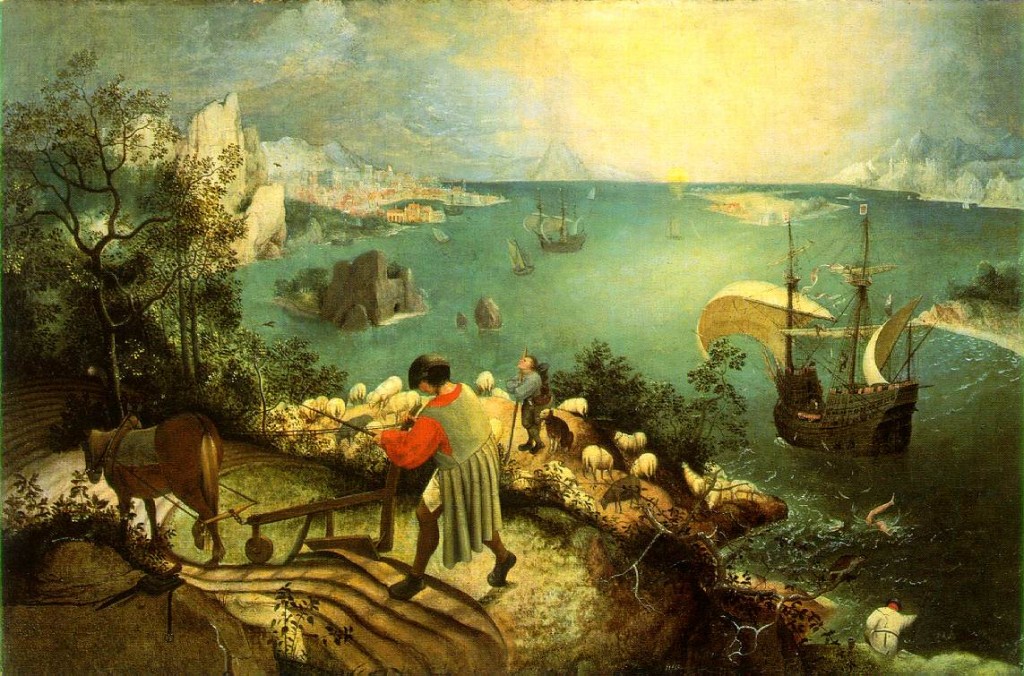Musee des Beaux Arts by WH Auden

“It’s like a whole universe unto itself. That’s one of the reasons I really love it.”
I first learned about this poem from an art teacher. I was doing an independent study with her and she was trying to get me to see connections between writing and visual art. This was my first assignment—to look at this poem and the painting that had inspired it.
The title of Auden’s poem refers to the museum in Brussels where he encountered a painting by Peter Breugel—Landscape with the Fall of Icarus. (The painting is now believed by the museum to be based on a lost original of Breugel’s.) In any case, here is a larger image:
(Do you see the legs in the water? Down toward the right lower corner?)
Here is the poem:
About suffering they were never wrong,
The old Masters: how well they understood
Its human position: how it takes place
While someone else is eating or opening a window or just walking dully along;
How, when the aged are reverently, passionately waiting
For the miraculous birth, there always must be
Children who did not specially want it to happen, skating
On a pond at the edge of the wood:
They never forgot
That even the dreadful martyrdom must run its course
Anyhow in a corner, some untidy spot
Where the dogs go on with their doggy life and the torturer’s horse
Scratches its innocent behind on a tree.
In Breughel’s Icarus, for instance: how everything turns away
Quite leisurely from the disaster; the ploughman may
Have heard the splash, the forsaken cry,
But for him it was not an important failure; the sun shone
As it had to on the white legs disappearing into the green
Water, and the expensive delicate ship that must have seen
Something amazing, a boy falling out of the sky,
Had somewhere to get to and sailed calmly on.
I love those first four lines. About suffering they were never wrong. . .
And, in the second stanza, I love the sense of being lifted off the ground—taken up into the sky to look at the landscape from a larger perspective. It’s what I remember from first encountering the poem and the painting, and I can feel it again now.
A sense of being able to get that wider view—the whole landscape. There’s the disaster of course. Icarus. He has this opportunity to escape Crete with his father. He has these marvelous wings. There’s just that one bit of instruction from his father: don’t go too close . . . But then he does. He has to. It’s part of the myth. He flies too close to the sun, his wings melt, he falls.
But in both the poem and the painting we’re not just aware of Icarus dropping through the sky. Nor only of Daedalus, his father, somewhere off-stage, watching horrified. In fact, they’re in the background. In the foreground is that ploughman, moving forward with the day’s work. And there’s a sense, too, of others in the landscape—they’re eating, or making supper, or having an ordinary conversation, or simply walking along. And then there are the ones on that boat—that expensive delicate ship—sailing calmly on.
There’s all of that. And this other awareness too—
The artist and the poet looking down on the entire landscape, seeing it all: the splash in the water, the last terrible glimpse of those legs, and, at the same time, or just after, all the others going on with their lives.
For me there’s an enormous compassion in this poem—and in this painting. It invites us to see how we all take our turn. We are Icarus, falling. We are the parent somewhere off-stage, watching the fall, feeling our heart break, beginning to understand that nothing again will ever be the same. We are the ploughman, going forward with yet another day’s work. We are the poet, getting a glimpse of the larger picture.
I think that’s why I like it.
See also:
The Favorite Poem Project. The poem is read in the video by Susan Hambleton, a painter in New York. The quote at the top of this post is from her video.
The image for the painting was found at ibiblio.org

